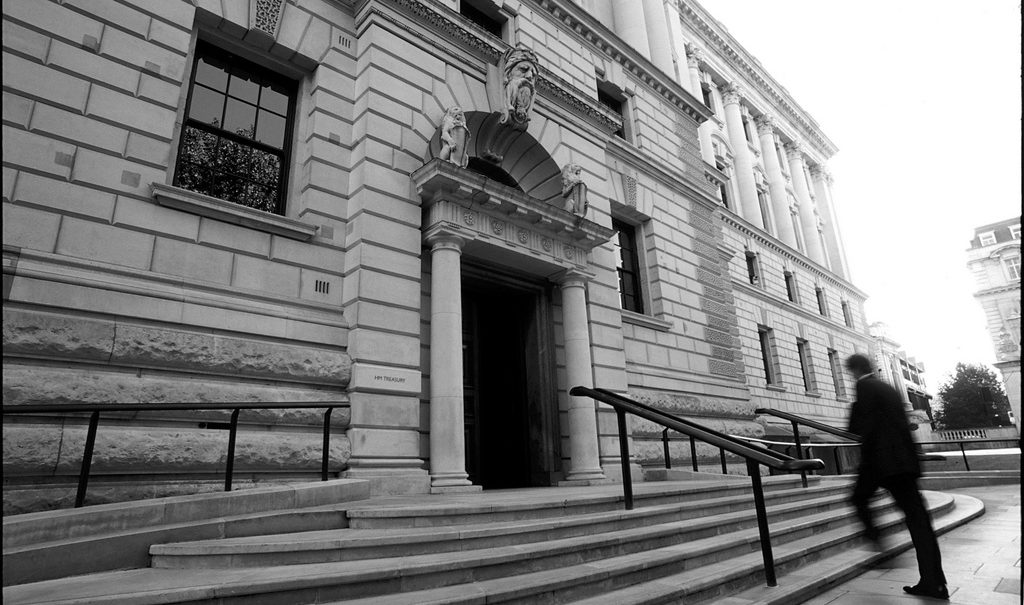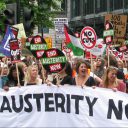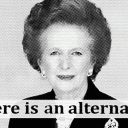Why there need to be checks on mainstream economics

Image: HM Treasury, CC BY-NC-ND 2.0
This summer I attended a behavioural science school at the University of Warwick. Among the speakers was the economist Paul Frijtas, who said something that sparked my attention:
“Individually economic ideas can be fantastically idiotic, but as a whole they provide the bureaucracy with a framework for thinking about the right things, communicating and looking at the data.”
This is quite a disarming rejoinder for us critics of mainstream economics, in that it already concedes most of the substantive points we might make about unrealistic assumptions, limited methodology and empirical issues (many of which Frijtas himself did not shy away from making for the duration of the School). Instead it throws up a different challenge: are any of our alternatives feasible, practical and comprehensive enough to provide a general framework for thinking about economic problems?
We may call for adopting a variety of perspectives – pluralism – but I am increasingly of the view that none of them can suffice in this regard.
Pluralism as a check
Any call for utilising pluralist economics needs to be clear on exactly how it would be put into action. Like it or not, the mainstream has a wide range of tools ready for use in situations: from business cycle management to competition regulation; from environmental protection to health policy; and for estimating the effects of both early education and criminal rehabilitation programs. Although there are many schools of economics which would ideally be incorporated into the pluralist’s toolkit, none of them are sophisticated enough to replace mainstream economics entirely. Schools such as feminist, behavioural and ecological economics are non-starters because they are designed to highlight specific (and important) features of the world which the mainstream has historically missed, rather than to present a full alternative vision of economics.
There are several approaches which are more general, including the well-established schools of Austrian, Marxist, and post-Keynesian economics. But it would be difficult to persuade institutions which utilise economics to embrace the former two for the simple reason that they usually object to the existence of these institutions altogether. Many Austrians would like to get rid of all governmental functions but the ones that facilitate basic market operations, which is not helpful for an economist working in the Government Economic Service (GES) or Bank of England (BoE). Marxists would go one step further and do away with the market operations as well, making it difficult for a private or public sector economist to whole-heartedly embrace the use of Marxist economics.
Post-Keynesians offer a sometimes appealing, non-burn-it-all-down vision of capitalism, but they are often focused on macroeconomics and are at best ambivalent about many of the microeconomic policy tools of the mainstream such as cost-benefit analysis, econometrics and auction theory, all of which are easily actionable for practitioners. The lack of workable alternatives outside macroeconomics makes it difficult to see what a ‘post-Keynesian GES/BoE’ would look like. At the other end of the spectrum, Agent Based Computational Economics (ACE) – which I wrote about recently – offers a variety of flexible simulations which could in principle be applied to nay problem. But this approach is arguably too flexible at this stage, such that there is not a standard framework from which analysis can be benchmarked and compared across problems.
So what is the role of pluralism? Increasingly I believe that it should function as a much-needed check on the mainstream, since if economic ideas can be “fantastically idiotic” then it goes without saying there are things they can miss. As the Nobel Laureate Robert Lucas put it “the construction of theoretical models…necessarily involves ignoring some evidence or alternative theories… [sometimes]… I simply fail to see some of the data or some alternative theory”. Pluralism can make the mainstream more aware of these blind spots.
If you think that to cast pluralism as a mere check on the mainstream is to diminish its role, you are mistaken. Highlighting problems the mainstream cannot see and proposing an alternative framework where necessary is hugely valuable, both intellectually and from a policy perspective. Feminist economics, for example, would highlight issues such as the gendered impact of recessions, or of infrastructure investment in developing countries. They would also suggest counting household and care work in GDP, which can drastically alter its level, growth of and volatility (up, down and down respectively, in case you’re wondering).
Ecological economics would force economists to look at the impact of economic activity on the environment, questioning whether growth represented true ‘progress’ or whether it was just borrowed by depleting natural resources and destabilising ecosystems . As with feminist economics, a revealing way of doing this is to incorporate ecological concerns into GDP estimates. And just as governments across the world have recognised that behavioural economics helps to simplify a vast range of government policies based on insights about how humans actually make decisions, the GES have recently recognised such ecological considerations in their Green Book.
However, we have a long way to go before pluralism is part and parcel of the economists’ toolkit, and this can have deleterious social consequences. Around a decade before he was appointed Chair of the Federal Reserve, Ben Bernanke dismissed the post-Keynesian Hyman Minsky’s Financial Instability Hypothesis – which posited that investors can become overconfident, getting sucked into speculative bubbles and ultimately crashing the economy – on the grounds that “the best course of action is pushing the rationality postulate as far as it will go”. Needless to say, this faith in the self-regulating power of financial markets was widespread among economists, policymakers and politicians in the run up to the crash.
Subsequently, the mainstream is trying to incorporate Minsky into its models, but the presence of post-Keynesians on monetary policy committees, in financial regulation authorities and as talking heads on the media would have been more helpful in the run up to the crash – which is why the phrase ‘too little, too late’ springs to mind. Who knows what other insights we have missed, or are currently missing due to the intellectual straightjacket placed on understanding and policymaking by the mainstream? To return to my above examples, Marxists might have voiced concerns about falling rates of profit and declining investment in the 2000s, while Austrians would have taken a step back to ask policymakers whether intervention, particularly in the form of low interest rates, could actually improve the situation at all.
Checks, checks and more checks
Of course, in a discipline as broad and socially impactful as economics, pluralism of economic ideas will not be enough. An obvious extension that is needed is interdisciplinarity: as this New York Times column pointed out, some knowledge of sociology – in particular the fact that work is not just a source of income but of identity and self-worth – might have helped economists to notice the problems emerging in former manufacturing hubs in the United States, seeing and speaking to them as individuals rather than as simple ‘costs’ in models of trade. No doubt similar insights could be gleaned from psychologists, anthropologists, geographers, philosophers and even humanities scholars if they had more of a seat at the policymaking table.
Any collection of experts making political decisions – no matter how diverse their expertise is – also needs to be accountable to the public. As a recent Guardian article about public economics education noted, the alienation and distrust people feel towards the economy and those they perceive to have power within it, believing that “economics is something that’s done to them, by people sitting far away in Westminster or the City”. One participant encapsulated the extent to which expertise shuts people out of democratic debate when she said “information is power…if I can learn in this class, maybe others will listen to me.”
Ensuring that experts were accountable to the people they served through public consultations and education programs would help to alleviate this sense of disconnection from economics and politics, and would likely help the experts too. The locals may not help you program your DSGE model, but they can highlight issues such as the regional economic disparities which have proven so salient since the financial crisis, a fact that dovetails nicely with the approach of sociologists and anthropologists to actually go out and speak to people. The Science Communication movement has learned a lot from this two-way, interactive model of participation, where both experts and non-experts are deemed to have valuable contributions.
A final, much-needed check on mainstream economics it the need for an ethical code akin to that of doctors. Relatively speaking, egregious ethical violations are rare in economics, but egregious violations needn’t be rare to be harmful, as some economists’ connections to the financial sector during the financial crisis showed. An ethical code combined with professional sanctions would prevent and punish such violations to the benefit of both society and of those economists (i.e. the vast majority of them) who have done nothing wrong.
Yet there is also a more general problem with ethics in economics: the embedded tendency to recommend policies based on purely ‘technical’ criteria without recourse to ethical considerations, something which only make sense if you consider the normative propositions of mainstream economics ethically neutral. Yet growth, efficiency and ‘Pareto optimality’ are no less politically contestable than economic freedom, well-being and security, even though the former are the focal points of most economic models. Sheila Dow has outlined a vision for ethics which tries to take a more pluralist view, outlining the professional duty of a discipline which has a large degree of socio-economic power.
From here to there
Ideally all or most of these checks would take place in the same person’s head, aided by a fully reformed economics education which encompassed pluralism, ethics, interdisciplinarity and communication. However, this is still a long way off, and in any case it is admittedly a little much to ask every economist and expert to be constantly aware of all of these issues in every decision they take. Thus, the inclusion of individuals, guidelines and consultation processes which involve people with different perspectives and create accountability mechanisms would be a valuable first step to pushing economics back in the right direction whenever it became too fantastically idiotic.






